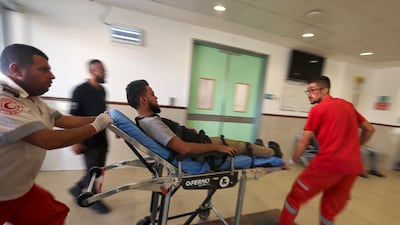Live updates: Follow the latest news on Israel-Gaza
Doctors in the occupied West Bank have warned that the financial crisis gripping Palestine's government may soon prevent them from providing proper care for sick and injured Palestinians.
The Palestinian Authority, which governs the occupied territory, has suffered from a massive hole in its finances since Israel began witholding tax revenues it collects on the PA's behalf following the outbreak of the Israel-Gaza war.
This crisis has decimated entire sectors in the West Bank, including healthcare, limiting the care that hospitals can provide and ultimately jeopardising Palestinian lives.
“If the situation continues like this for a period of 45 days to two months, we have warned the Ministry of Health and the people who monitor our work that the quality of our services will not be the same,” warned Dr Yousef Takruri, the head of the union of private hospitals in the West Bank. “This will have an impact on Palestinians.”
The financial crisis is also directly affecting healthcare workers, who have not been receiving their full salaries.
Dr Nadeem Shaheen, a resident neurosurgeon at Istishari Arab Hospital near Ramallah, is among the thousands of healthcare workers across the occupied territory who have only received half their monthly salaries since October 7.
“I’ve had to cut back my house loan payments to half,” Dr Shaheen said. “The shortage of money directly affects your family and life.”
Despite his difficult personal situation, Dr Shaheen - who has spent much of his adult life working to realise his dream of beocming a specialist doctor - remains determined to provide the best care possible for his patients.
“We are always ready to provide care,” he told The National.
Providing this care is an uphill battle due to the Palestinian Authority's financial problems and the Israeli occupation.
According to the World Health Organisation, 45 per cent of essential medications are out of stock. In most areas across the West Bank, primary care clinics and outpatient facilities are only operating two days a week. Hospitals are operating at just 70 per cent capacity.
Dr Takruri said the PA owes hospitals nearly $700 million, which has led to a shortage of materials and a serious strain on the system.
He explained that in the immediate aftermath of Hamas’s October 7 attack on southern Israel, in which the militant group killed 1,200 people and kidnapped about 240 to Gaza, and Israel’s military response, hospitals in the West Bank stockpiled six months-worth of supplies.
But the war has persisted for more than eight months, and now hospitals are beginning to feel the crunch.
“We're getting to the ninth month of the war,” Dr Takruri said. “We are unable to replenish all the missing material.”
Dr Takruri said cancer and cardiology patients are among those who may be most affected by the medical shortages.
“We are unable to buy the batteries that operate pacemakers.” he said. “A pacemaker costs 60,000 shekels; in order to install the pacemaker, it costs 7,000 shekels. We neither have the 60,000 nor do we have the 7,000. In order to order cancer medicine, you need to pay for it and so we have a shortage of that too.”
The Palestinian healthcare industry relies on private hospitals for speciality services and treatments. The Palestinian Authority sends patients to the private hospitals and is supposed to reimburse them for the care provided.
Lack of funds
The PA’s worsening financial situation means it can no longer pay for the care hospitals are providing patients.
About 70 per cent of the authority's annual revenue comes from taxes that Israel collects on behalf of the West Bank governing body.
Under the Oslo Accords, Israel is supposed to transfer that revenue to Ramallah on a monthly basis.
But Israel’s far-right Minister of Finance Bezalel Smotrich has effectively stopped those payments, holding the money hostage and leaving the Palestinian Authority unable to pay full salaries to public sector workers.
The US, one of the staunchest allies of Israel, has repeatedly urged its government to release the funds in order to stave off the authority's financial collapse.
Washington believes that a strong and reformed Palestinian Authority is essential to a future Gaza.
Without either the tax revenue owed or help from foreign countries, the authority's financial future is in serious jeopardy.
“They don't have enough money to pay part of their salaries for the end of this month,” said Samir Hulileh, a leading Palestinian economist. “They may have [enough to pay] 30 per cent but usually they shouldn't pay less than 50 per cent and they don't have it.”
Mr Hulileh said the Palestinian Authority's money problems were coming to a head and that the governing body had weeks, not months, to find funds.
“The question is, if they don't pay, what will be the actions of people that are suffering,” Mr Hulileh told The National. “This is not the first month or the 11th month, it's much more, I think the whole issue of this government is coming to an end soon.”

The West Bank’s financial problems are compounded by the fact that more than 100,000 of its residents would normally work in Israel but have been barred from entering the country since the start of the war.
In addition, Mr Smotrich has vowed not to renew a crucial waiver that allows Israeli banks to work and transfer funds to Palestinian banks. If the waiver is not renewed on July 1 it will be yet another devastating blow to the West Bank’s economy, which for the most part uses Israeli shekels.
Mr Hulileh said without the waiver both the West Bank and Israel's economy will suffer.
“It's one boat,” he said. “He is just making sure that the boat sinks with both of us in it.”

Patients suffering
Meanwhile, outside Istishari Arab Hospital, a gleaming facility built in 2016, Shaher Bilbaisi sat on the ground, his knees pulled up close to his chest as he leant against the building's exterior wall, a cigarette in hand. He told The National that he was worried about his sister, who was in intensive care after suffering a heart attack.
Inside the hospital, workers continue to scramble to provide the best services possible, despite patients who often cannot pay and a government that cannot either.
The hospital is short of PPE and other disposable equipment and has had to postpone elective surgeries.
“We feel bad for the patients,” Dr Shaheen said. “Patients have the right to receive the right care at the right time.”
But as the war grinds on and Israel withholds the tax revenue, that becomes increasingly difficult for doctors and nurses across the West Bank to provide.


